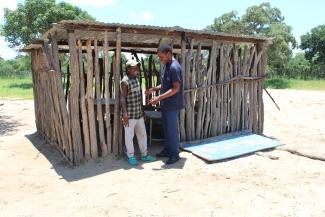Klaus Kazungo, a Registered Nurse for Voluntary Medical Male Circumcision (VMMC), thought Toivo Songora was joking when he volunteered to be first in line for circumcision in Mpengu Village in Namibia’s Kavango West Region, during a clinical outreach campaign.
But Toivo wasn’t kidding. If anything could help convince boys from his school and men in his community that circumcision was worth thinking about for medical reasons, it was seeing the 27-year-old schoolteacher go first.
Toivo’s circumcision story began when he received a call from nurse Kazungo, informing him that the VMMC outreach team was planning a visit to provide services at a school 10 minutes from his home at Mpengu Village. Toivo was interested in getting circumcised for some time but was unable to access the service due to the distance to the nearest public health facility, which is 70 kilometers away.
As a teacher, Toivo knows the value of health information. When he learned that circumcision reduces the risk for men to contract HIV through sex with women by approximately 60%, he wanted to ensure that his community received this information too, and that they could access VMMC services for free.

Mpengu Village is located in Namibia’s Kavango West Region where HIV prevalence amongst 15-49-year-olds stands at 13.6%, which is above the national average of 11.4% as per current UNAIDS estimates. Kavango West is rural in character and many people are still hard to reach with health services.
Low rates of male circumcision are often associated with high rates of HIV infection. Circumcision removes the risk factor foreskin with a “smart cut.” Uncircumcised men are not only more likely to contract the virus themselves but also significantly more likely to transmit it to their sexual partners in comparison to circumcised men. Additionally, the female partners of circumcised men have a reduced risk to develop cervical cancer because these men are less likely to transmit the Human Papillomavirus (HPV).
To boost service uptake, the regional VMMC team undertook an outreach campaign in Kavango West. Ensuring that men and boys over 15 years old in his community benefit from the opportunity, Toivo asked the village chief to organize a community meeting to reach out to the people of Mpengu Village with the help of VMMC mobilizers. The team invited women and men from the community to tell them all about the advantages of being circumcised.
“After this very engaging activity where people were able to ask questions and get clarity about the benefits of VMMC and possible risks, ten men and boys signed up for the services,” said Toivo – and on the day of the outreach, he was proud to be among the first to be circumcised.


“We are grateful for the circumcision services. It would be good if this outreach campaign continued as there is a lack of transportation, and the nearest healthcare facility is far away. Our boys need to receive these services while they are still young so they can stay healthy,” highlighted village headwoman Annastasia Nairenge.
Thanks to Toivo, a total of 18 men and boys were circumcised that day, followed by more than 150 clients who came from surrounding villages over the coming weeks.
“Many older men have come to ask me about the procedure and experience as I continue to talk about the advantages,” Toivo said. “Please come again after the rainy season as there are still more people who would like to be circumcised but are currently busy with farming activities.”
The VMMC outreach campaign is a great success in reaching school children and community members living in remote areas of Namibia, bringing much-needed medical attention and support to those who need it most. The campaign continues in Kavango West and East as well as other regions.
Under the leadership of the country’s Ministry of Health and Social Services, the VMMC project has thus far successfully circumcised more than 85,000 Namibian boys and men of which 70% haven been reached through outreach campaigns. Funding from the American people through the U.S. President's Emergency Plan for AIDS Relief (PEPFAR) and the United States Agency for International Development (USAID) make project implementation by ABT Global possible.
More information about VMMC services in Namibia is available on https://www.facebook.com/VMMCNAMIBIA/ and https://www.instagram.com/vmmc_namibia/.
